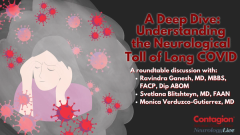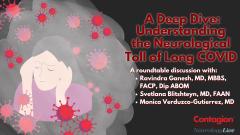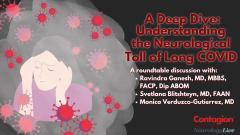
Long COVID’s Impact on the Brain, Specifically Cognitive Function
In our latest roundtable series, experts highlighted research showing that even mild COVID can result in cognitive impairment including brain fog and IQ decline.
Episodes in this series
Since the start of the COVID-19 pandemic, the persistence or appearance of neurologic symptoms after clearance of SARS-CoV-2 infection has become a serious health challenge for patients and clinicians worldwide. The effects of postacute sequelae of SARS-CoV-2 infection (PASC), commonly known as
As emphasized by the research and experts in the field, currently there are no specific tests for the diagnosis of Long COVID, and clinical features such as laboratory findings and biomarkers may not specifically relate to the condition. It is important to develop and validate biomarkers for the prediction, diagnosis, and prognosis of Long COVID and its response to therapeutics. Regardless of age or preexisting health conditions, Long COVID can affect anyone, highlighting that this condition is not restricted to any specific demographic and does not discriminate, even against the healthiest individuals.
Recently, we conducted a Long COVID roundtable in collaboration with
Our panel of clinicians include:
- Ravindra Ganesh, MD, MBBS, FACP, Dip ABOM, general medicine doctor at the
Mayo Clinic and leader of their Long COVID clinic. Svetlana Blitshteyn, MD, FAAN , clinical associate professor of neurology at the University at Buffalo Jacobs School of Medicine and Biomedical Sciences, director of the Dysautonomia Clinic.Monica Verduzco-Gutierrez, MD, physical medicine and rehabilitation physician, professor, and chair of rehabilitation medicine at UT Health, leader of the Long COVID clinic.
Transcript edited for clarity.
Blitshteyn: Well, we know from multiple studies that COVID does not have a positive effect on cognition, and many patients with long COVID experience cognitive impairment, which is termed brain fog. Early on, studies showed that it was quite rare for the virus to be found in brain tissues. More likely, there is some kind of neuroinflammatory process with microglial activation, small vessel disease, a hypercoagulable state, platelet activation, and certainly, effects on the brain from potential microbiome alteration and autonomic dysfunction at the central level. These are all possible mechanisms.
From cognitive studies, we know that even in patients who feel fully recovered, there is a measurable effect from SARS-CoV-2 infection. Recently, there was a study from the UK that found a 3-point decrease in neurocognitive testing, equivalent to a 3-point IQ loss, in patients with mild COVID who felt recovered. Patients with lingering, long COVID symptoms had neurocognitive testing scores decreased, equivalent to a 6-point IQ loss. Those who were hospitalized in the ICU experienced a significant loss, equivalent to a 9-point IQ drop. It's staggering when you think about it. Even when you feel well and think you're fully recovered, just the fact that you had an infection may worsen your cognitive state, and that is very important. I think this represents one of the major public health issues in neurology and neuroscience.
There is a huge push for brain health initiatives right now, and to me, this is one of the major topics we must focus on. How does it affect adults? How does it affect children and teenagers who continue to have recurrent COVID infections? While most mitigation strategies have been removed—no more indoor masking, widespread testing, or concern for air quality—and as school starts in August and September, this is very concerning to me as a neurologist.
In a nutshell, it’s important to mention that SARS-CoV-2 started as a respiratory virus. However, I think through mutation, it now shows an affinity for vascular pathology, hypercoagulability, and certainly an effect on the brain, likely through neuroinflammatory pathways. We also need to mention the importance of viral persistence and how that plays into whether viral particles activate neuroinflammation and autoimmunity, which still needs to be studied. But on a larger scale, I see this as a major public health issue, significantly impacting cognition and brain health at the population level.
Verduzco-Gutierrez: I couldn’t agree more with everything she said. To answer how long COVID impacts the brain and cognitive function—in one word: terribly. We don’t know what else is to come in the future. A recent study showed that two-thirds—about 63%—of people over 65 who were hospitalized for COVID were already experiencing cognitive decline. We know cognitive decline can lead to dementia. We really have to consider that this will disable people, not just physically, but mentally and cognitively as well. That’s going to be a big burden on our populations as they age. I just couldn’t agree more—this is a public health issue. We have to continue to prevent infections.We’re seeing these impacts in people, as she said, who had mild cases of COVID and got better, yet experienced IQ drops.
Ganesh: What’s exceptionally scary are the people who’ve had COVID 6, 7, or 8 times, right? These are the individuals who will experience the most profound impacts, second only to those who were in the ICU. With the current variants and the lack of truly effective preventative measures, it’s concerning. The vaccine right now isn’t great, and there have been reports of escape even from the new monoclonal antibodies. It’s a bit worrisome at the moment.
Blitshteyn: I want to add that there are also studies showing brain aging by 10 years. Other studies show it accelerates neurodegenerative processes and may be a vehicle for Parkinsonian symptoms and alpha-synucleinopathy. When you delve into the neuroscience literature, the impact is so big that you really start to worry. I think that’s a major area of research, from both a research standpoint and in terms of public health measures. I believe we need to do everything we can to mitigate infection. We may not fully prevent it, but reducing the risk of transmission and reinfection should be our goal.
Verduzco-Gutierrez: We have so much to say about this because we all love neurologic conditions, right? We could just keep going. But before COVID, I used to care for patients with post-polio syndrome, and we knew that the aftermath of polio sometimes showed up decades later. So, we still don’t know what we might see decades from now with COVID. I think that could be part of the dimension we’re missing, but we’ll see.
Stay tuned for future episodes in the coming weeks.
Newsletter
Stay ahead of emerging infectious disease threats with expert insights and breaking research. Subscribe now to get updates delivered straight to your inbox.






































































































































